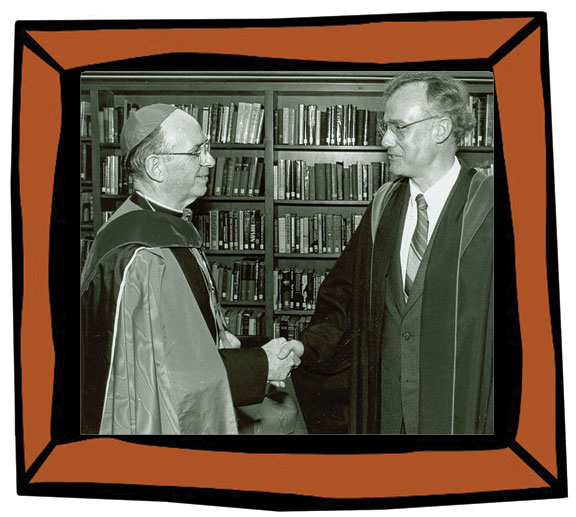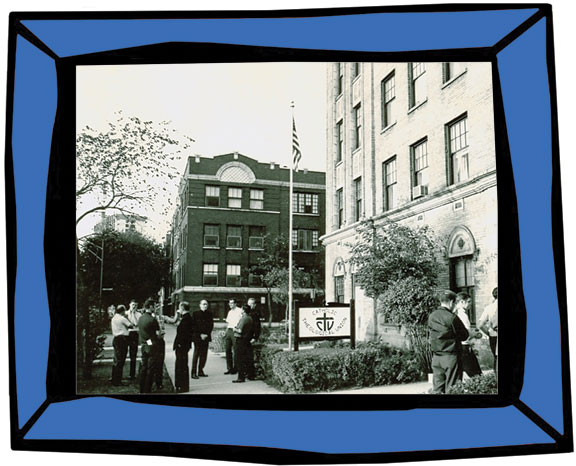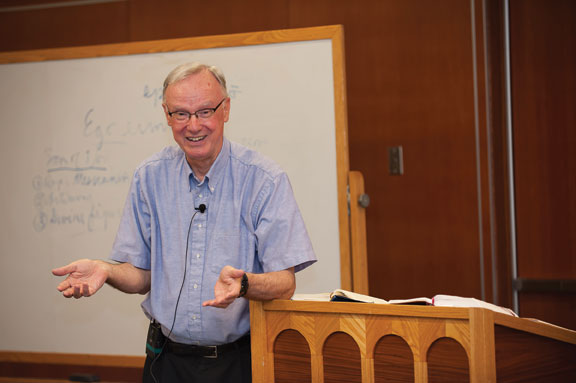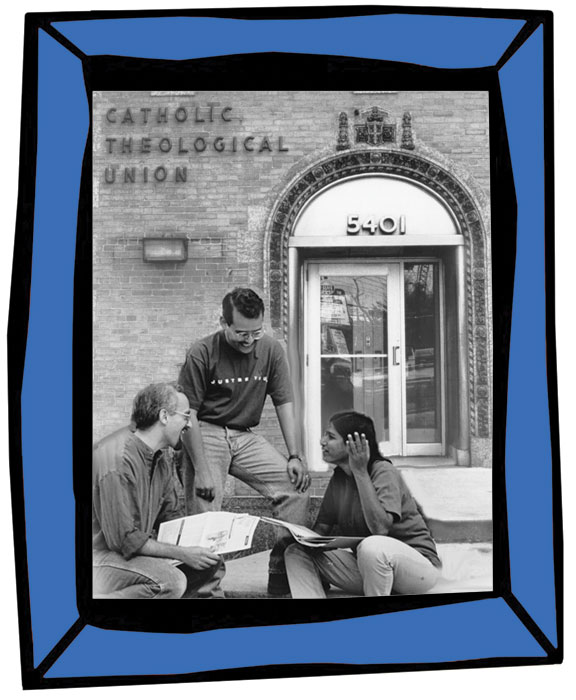 |
Cardinal Joseph Bernadin (left), archbishop of Chicago from 1982 until his death in 1996, greets Father Donald Senior.
Catholic Theological Union |
Collaboration is not easy. And Passionist Father Donald Senior knows it. Senior is professor of New Testament studies and president emeritus at Catholic Theological Union (CTU), the largest Roman Catholic theological school in the United States.
In the world of graduate-level theological education, Catholic institutions come in several varieties. A freestanding seminary is usually owned by a single diocese and trains men from that diocese, and other smaller dioceses, to be priests. On the other hand, a school of theology is usually operated by a single religious community, like the Jesuits or the Benedictines, but educates both members of the sponsoring community as well as men and women from other religious communities, and even lay people. Finally, Catholic universities like Notre Dame or the Catholic University of America offer theology as an academic discipline.
CTU is a school of theology, but it doesn’t fit the mold. The Union’s story began in the tumultuous year of 1968. Three men’s religious communities — Franciscans, Passionists, and Servites — wishing to live out the Second Vatican Council’s spirit of renewal, closed their individual seminaries and established a single theological school, sharing faculty, staff, libraries, and finances. Today, 24 religious communities are corporate members of the Union — many of them missionary orders with an international outlook. The Union’s headquarters is the Hyde Park neighborhood of Chicago, where ecumenism flourishes among neighboring non-Catholic seminaries as well as the University of Chicago. About a third of CTU’s students come from outside the United States.
Senior served as CTU’s president for 23 years. He is past president of the Association of Theological Schools (ATS) and was appointed by Pope John Paul II to the Pontifical Biblical Commission. In addition, he is general editor of the Catholic Study Bible and co-editor of the 22-volume New Testament Message commentary.
This fall I talked with Father Senior to talk about his leadership at the Catholic Theological Union.
Q What advice do you wish you would have been given when you took over the leadership of CTU?
I came into the position abruptly when my predecessor resigned. I was in Australia on sabbatical and was called back. I had been acting dean, but I loved teaching, and so I was thrust into things. I wish someone had told me how the transition from faculty member to president is an experience that suddenly places you in a different relationship with colleagues. I could have used a bit of warning about that.
Q What was the best advice you received?
I was told that the role of president carries with it a lot of symbolism and people react to that in different ways. Over the years, a lot of my needed advice came from peers —presidents of other institutions. For example, CTU was part of a Pew globalization grant, and the grant allowed 10 or 12 participating presidents to meet annually. It was there that the war stories helped me to understand better the complexities of my role, to learn about mistakes to avoid, and to appreciate the helpfulness of collaboration when one is in leadership.
 |
The Catholic Theological Union opened in 1968 when three religious communities, closing their individual seminaries, joined to form a single school.
Catholic Theological Union |
Q Many In Trust readers are board members. CTU has two boards, which seems unwieldy. Can you describe the makeup of those boards as well as the challenges and the strengths of this structure?
Because there are 24 religious communities that make up CTU, we have a corporation board that consists of the 24 major superiors of these orders. They are the “owners.” This corporate board holds the mission and the budget.
Our board of trustees is, however, a real board. It is not advisory — compare this with some Catholic seminary boards, which are more advisory in nature. But the CTU board is a genuine trustee board with the mandate of appointing the president and dean and determining institutional policy. There is a committee structure, and the full board meets four times a year.
As president I interacted chiefly with the board of trustees, but I have to say that the corporation board was very supportive. The major superiors of the participating religious communities don’t belong to the trustee board — early on, they felt they couldn’t give appropriate attention to such membership and so they have continued to depend on the board, along with the president and dean, to report to them. A few years ago there was a Vatican visitation of the American seminaries. The visitors from Rome were puzzled by our two boards, because they were not used to a structure in which one person didn’t act like a bishop. With our corporate structure, a convener is elected for a three-year term from among the membership. Liability is equally shared, and each of the orders, no matter the size, has equal voice. There have been no instances of a house divided — no instances of tribal loyalties.
Q What have you learned about the relationship between president and board during your tenure?
When I was a faculty member, I hadn’t thought about such things. But when I became president, it didn’t take long to realize that my relationship with the board was of huge importance. And one of the motivators of this realization was our need for men and women who could lead us to the professional and business worlds.
In Trust readers know the importance of fundraising for the health of theological schools. We cannot rely on tuition, so we need links to quality people in the business and professional worlds who understand both our mission and our need to connect to sources of funding. Early on, a development consultant said to me, “Don’t settle for familiar type people.” He meant, “Don’t pick a lot of academics!” That was an important lesson for me as we got our development program under way. There were faculty members worried that board members from the business world would not understand theological studies. But we kept an open-minded spirit and were able to build a board that provided expertise as well as thoughtful care for the mission.
Q What is CTU’s relationship with non-Catholic schools?
We are part of the 11-member Association of Chicago Theological Schools (ACTS). This arrangement allows open cross-registration for students as well as cross-cultural offerings. It is part of the wallpaper. For me it has meant a lot of close collegiality among the leaders of the institutions.
We have a shared ecumenical D.Min. program with McCormick Seminary and the Lutheran School of Theology at Chicago. Across the ACTS schools, finance and development people meet face to face, and the library system is linked electronically. There is a courier system for library loan deliveries, and the librarians meet periodically and have an acquisition policy that allows for sharing expensive reference works.
Q What are the challenges to your collaboration with other seminaries?
They are not denominational. The main challenge is having sufficient administrative structure to foster interactions that are important to all of us. We do pay dues and that supports a part-time convener. Unfortunately economic pressures have kept us from having a full-time administrator.
One of the healthiest advantages of this arrangement is that cross-registration puts students of varying denominations together. There is a hunger for mutual understanding and plenty of opportunity for humor too. For example, when a student posted Martin Luther’s Ninety-Five Theses on our door one Reformation Day, it was appreciated as humor — but it was a teaching moment as well.
Q Are there advantages in having future priests share classrooms with lay women and men, and with members of varying religious congregations?
This is so important. We have 500 students, and about 130 or 140 are seminarians on the path to ordination, while the rest are lay people studying for advanced degrees. ATS requires exit interviews when students graduate and, among other questions, they are asked to name the most helpful aspect of their education. The seminarians invariably report that being in class with lay men and women has been among their most positive experiences. The lay students say the same about being in class with future priests. Furthermore, our provincials are unanimously in favor of this.
Q During the course of your presidency, did you make changes in the curriculum?
Catholic theological education in the United States is guided by the Program of Priestly Formation (PPF). The PPF posits four “pillars” that undergird a seminarian’s program of study leading to ordination — intellectual, spiritual, pastoral, and human formation. Of the four, I believe that human formation, which develops a future priest’s relational capacities — is so helpful in our complex and changing church and society.
We have had several major curriculum revisions over the lifetime of the Union. At first, the curriculum was very much discipline-based. In 2006 we changed the curriculum to add integrating elements throughout the program, including theological reflection on field experiences that offer future priests and lay ministers real experiences in parishes and other ministry situations. Another important development at CTU has been our outreach to the Jewish and Muslim communities. A third of our students are from outside the United States, representing 42 countries. We have about 15 Muslim students and a strong Islamic studies program. Practically from the beginning of CTU, we have had a Jewish studies program, and we also have a program in Jerusalem during the January term, with about 30 participants per year. One example of the courses we offer is “Abraham’s Children,” which is taught by Catholic, Jewish, and Muslim faculty members. This ecumenical thrust is integral to the whole seminary experience — it pervades the entire school. Students learn to understand their own tradition while respecting the traditions of others. It is important that future priests engage in dialogue with others who are not Christian. This is extremely formative for them. And while this is important for the members of missionary orders, I am convinced such an educational approach is crucial for all our students, religious and lay, as our world becomes more diverse.
Q CTU and DePaul University have entered into a new partnership. What’s happening?
 |
After leading the Catholic Theological Union for 23 years, Father Donald Senior has returned to the classroom as professor of New Testament studies. He's also a member of the Pontifical Biblical Commission.
Mark Campbell Creative LLC |
We have had a relationship with DePaul since we started in 1968. Before CTU was accredited, DePaul granted M.A. degrees to our graduates. Also, we’ve had a DePaul representative on our board of trustees since the beginning. DePaul doesn’t have a graduate theology department and so the relationship has been important to them too. There are so many things we can do together.
I have worked together with Father Dennis Holtschneider, president of DePaul, to develop an educational alliance. It is not as formal as a merger, but it is legalized and allows us to share many things. For example, we can purchase services together, gaining economies of scale, and share in areas like legal services and technology. The alliance allows for exchange of faculty as well as faculty development in theology for DePaul faculty. Our students benefit from interdisciplinary courses such as “theology in media” and “theology in the arts.” These tap into DePaul’s strengths. Next May the DePaul trustees will meet in Jerusalem, and I will be their guide.
Q How do you compare today’s students with students early in your career?
Of course, the diversity of our student body is a big difference. But the biggest difference is not academic capacity but rather their personal experiences and family experiences. Family backgrounds are so diverse, and many students have experienced personal struggles.
Our lay students are as bright as any previous generations of students, but many are not deeply embedded in Catholic practices. Some also need help with language skills. At the same time, I see in them a maturity about the Church as an institution — they are not so caught up in some of the in-house debates about authority structures as previous generations were.
 |
Since its founding 45 years ago, the Catholic Theological Union has made its home in Chicago's Hyde Park neighborhood, where it's part of a community of theological educators that includes Lutherans, Presbyterians, and members of many other denominations.
Catholic Theological Union |
Q Looking back, what are some of your biggest surprises?
There have been a lot, but the Muslim program is certainly a big one. I take groups of our trustees and friends to Israel each year. In 1999 a board member on the trip was so taken with the experience that he then funded the Muslim program.
Another surprise is the mushrooming of lay students. We had our first woman student in 1974 —now our enrollment is 40 percent female. And another surprise was being called back to be president after having already served two terms — I had already happily returned to the faculty!
Q How does a long-term president step away from the presidency gracefully?
I had conversations with the board about succession, and they asked me to let them know when I thought the time was right. The strategic plan, new buildings, and accreditation all were in place, so my transition out was deliberate and planned. I think it was a calm process.
Q And your job description as president emeritus — how does that read?
So far there is not a formal definition of my role. I will be teaching New Testament courses, and I will be happy to help Father Mark Francis, my successor, with some development work if needed. We are also starting nontraditional programs for lay executives of Catholic Charities USA and also a program for lay administrators in the Franciscan Health System. I will likely be working with those programs.